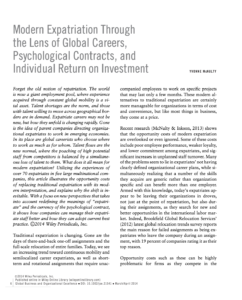
Modern Expatriation & Global Careerists
Also, besides COVID-19, the global war for talent is ongoing. Companies are still operating on a global scale and need qualified and experienced employees to master the task. In a very interesting piece, Yvonne McNulty, one of the best-known researchers in the field of expatriate management, is shedding light on what is changing in expat recruitment. In this blog post, I am sharing some insights from this study and explain the effects on the accompanying family and especially the expat partner.
What's the source?
I have linked the source here for further research. Academic papers are a vital part of my work and I encourage you to have a look for yourself
Who is the typical expatriate of the future?
McNulty, just like many other experts in the field, argues that the face of the typical expatriate is changing. Until recently, the so-called PCN (parent-country national) was the main type of expat. Typically, a „senior male staff in their late 40s or early 50s from Western countries sent by a corporate headquarter to a subsidiary office in another country.“ The power dynamic was clearly one-sided. The company decided on when and where to go and the employee followed motivated by a very attractive compensation package.
This traditional type of expat is slowly replaced by employees who are either highly motivated to go abroad and are not too focused on compensation viewing themselves as global careerists or otherwise already living abroad. In the academic world of global mobility, there seems to be an endless number of different expat types with all kinds of abbreviations. To keep things simple I will introduce each type in the box below and explain it shortly. For this text, we will focus on the global careerists in general, as it describes the shift in expat management the best.
PCN: Parent-country national
CAE: Company assigned expatriates (same as PCN) (Moves are directed and controlled by an organization)
SIE: Self-initiated expatriate (same as TCN)
TCN: Third culture expatriate (qualified workers who move to new countries of their own volition, without company support)
FELO: Foreign local hires/ Foreign executives in local organizations
The world is now a giant employment pool, where experience acquired through constant global mobility is a vital asset.
Trends within expatriate recruitment
The global careerist
- Today the expatriate’s career focus is often much more long-term than the one of the organization. While companies do often underestimate their role in the repatriation phase and the integration of the employee back home, the modern expat is taking career planning into his own hands. The so-called global careerist is a new, much more independent type of expat. Typically not linked to any particular home country, this type of expat gathers work experience in several countries around the globe. They aspire to fit the assignment into their personal aspirations of living a global life. As McNulty puts it they „…are driven by more than financial gain because their motivation rests largely in being global; these are professionals who, though educated and trained in one country, choose to develop their career elsewhere.“
Sort-term Assignments
- There is a trend to more short-term assignments, partially unaccompanied by the families. While this is obviously easier to manage for corporations, less risky in times of uncertainty, and less expensive, it certainly has a price tag that is often overlooked: The employee is less effective abroad, less attached to the project, and is lacking the support of the family. As McNulty puts it: „the opportunity costs of modern expatriation are overlooked or even ignored. Some of these costs include poor employee performance, weaker loyalty, and lower commitment among expatriate, and significant increases in unplanned staff turnover“. I have talked about the shift to short-term assignment in this blog post as well.
Emancipation of the Expatriate
- Another trend is the increasing emancipation of the employee. While the profile of the traditional expat above shows that the power dynamic was clearly one-sided the modern expatriate is not easily attracted by attractive compensation packages but more by the opportunity itself. The employee is motivated by long-term career planning (something that is often overlooked by companies) and the opportunity of living abroad itself. Combined with the global war for talents, he or she is more willing to change companies when the opportunity arises. While companies tend to calculate their Return-on-investment (ROI) when sending people abroad, employees are also starting to ask for their own internal Return on Investment. McNulty defines this internal ROI as „the internal ROI draws on individuals‘ motives for undertaking and accepting international assignments and the perceived benefits in relation to personal and professional gains.“ As a consequence, employees are less loyal than they once were and are discussing expatriation as a lifestyle decision rather than purely a career decision.

What companies need to do
In order to keep up, companies need to reevaluate how they attract their candidates. McNulty recommends the following:
- Recognize that many (global careerists) exist in the organization, despite their covert nature
- Identify where they are among their ranks
- Strive to understand what makes them tick, and
- leverage their skills and talents in the short term without losing sight of long-term opportunities.
Clearly, today's expatriates are gutsier than ever.
While this next generation of expats is willing to take more risks and does not per default demand an overwhelmingly attractive compensation package, it does not mean that companies don’t have to offer something.
Just because there is a huge part of self-initiative amongst global careerists, does not mean that there is no need for family support. Certain support aspects of the expat package can’t be exchanged by a salary raise. The emancipation of the expatriate also strengthened the position of the family itself.
But what is those expat families truly want from an organization? In global HR, this is described with the term „Psychological Contract“.
The Psychological Contract
„A Psychological Contract is an indirect, unwritten and often unspoken agreement between an employer and employee“. So compared to the written employment contract it is very vague and hard to grasp. It describes the relationship of the expatriate to the company and the trust and loyalty involved. With the change of the nature of the typical expat, the psychological contract increases in importance. Companies are increasingly aware of the importance of creating a stable and supportive partnership.
In psychological contract terms, family support during expatriation is immensely important, because relocating abroad affects everyone, not just the person employed by the company.

The three currencies of the Psychological Contract
1. Career Management Support - Global Career Opportunities
Employees and their families are looking for a long-term strategy. What will happen after we repatriate? Will there be a suitable position within the company? Will there be an opportunity to extend the assignment if preferred by the family? Those questions are more important than ever and effectively influence the degree of loyalty towards the company. Especially with kids involved, families are looking for stability besides living the adventure of a global life.
2. Compensation - Local-plus Localization
If a contract is changed to a local contract after a couple of years with all the financial consequences for the family, many are deciding against it and resign.
3. Family Support - Socialization, Adjustment, Dual-Careers
Companies are increasingly aware of the influential factor of the family on the employee’s work performance. In terms of the psychological contract, it is important how the company communicates with the whole family and what kind of support is offered. „In short, although psychological contracts exist between employers and employees…it is not unreasonable to find that the partners of expatriates also have psychological expectations about how they and their families – and especially their children – will be treated by a company, regardless of the non-employee status…“. An open dialogue with not only the employee but the partner is the best approach to maintain a healthy psychological contract.

What does that mean for you as the expat partner?
It is vital to understand the shifts in the global market. Keep yourself up-to-date with the latest development in global Human Resources to assess the value you are offering to the company sending you abroad. Research and keep up to date with recent development is the foundation for emancipation.
Secondly, thinking about becoming more proactive in the negotiation process of expat packages. I have written a blog post about that here.
Third and most important: Discuss as a family your wishes and boundaries when it comes to expatriation. What should be part of the written but also psychological contract between you as a family and the employer. Keeping in mind the changing nature of international assignments there is more flexibility so it is key to define what you are looking for as a family and what safety net (if any) you require.
Thank you for following along! If you do not want to miss out on new blog posts sign-up for the SharetheLove Newsletter or text me (info@sharethelove.blog) if you are interested in a 1:1 coaching session. Also if you want to join our next mastermind group you will find all the next dates here.












Eine Antwort
Thank you, Kate, for sharing this research and your reflections. I would also encourage employers to invite internationally mobile staff and their partners for a conversation about motivations, needs and ambitions. Equally I would encourage the individuals and their partners to seek such conversations as a couple. Couples / families who want to explore the world are best advised to create a long term view so as to empower themselves to develop opportunities in line with that view.